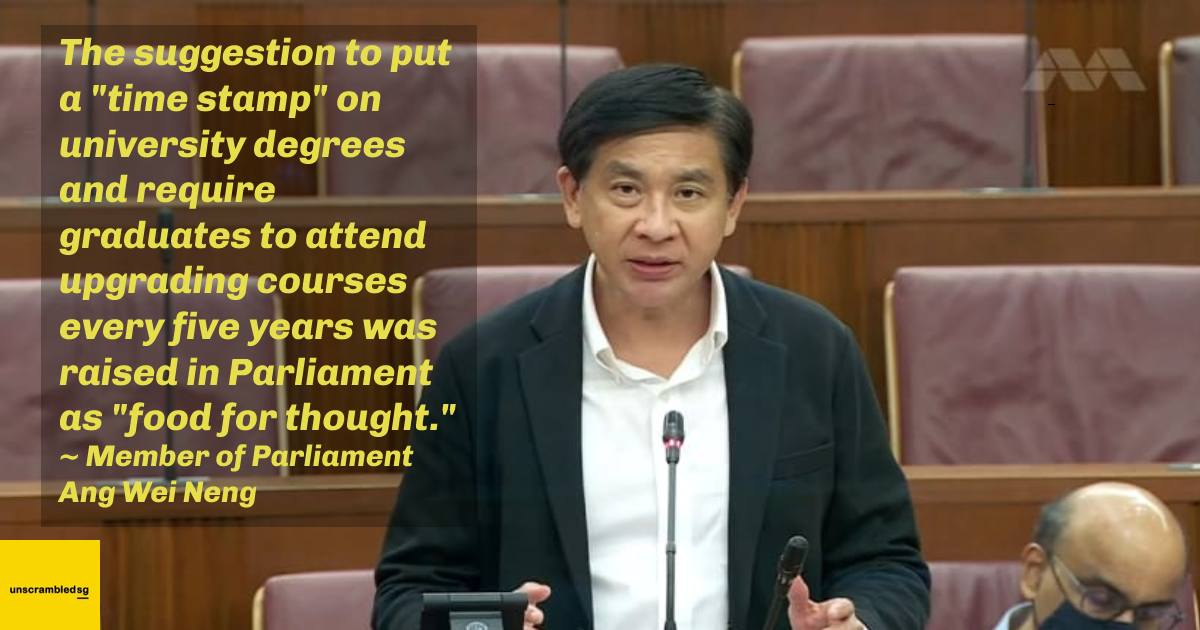TL;DR – “Time stamp” on university degrees? MP Ang Wei Neng has since clarified that it’s just “food for thought”.
Weeks ago, Member of Parliament Ang Wei Neng floated a “radical” idea of having “time stamps” on university degrees that were conferred by the local universities.
His idea meant that graduates would need to attend upgrading courses every 5 years or so to retain the validity of their degrees. The internet went wild over this idea but many netizens missed his ACTUAL point. Also, he has since clarified that it’s just “food for thought” lah. Chill OK?
Banked on your university degrees? Continued learning is more important!
Lifelong learning involves the process of continued learning through gaining knowledge, honing skills and even picking up new skills, whether within or outside of formalised centers of learning.
On a personal level, many find fulfillment in picking up hobbies that spark their interest and enjoy developing certain aspects of their life. On a cognitive level, many studies have proven that continued learning has a positive effect on brain cells and can even slow the physical process of diseases like Alzheimer’s.
Now, any worker can attest to the ever-evolving and dynamic shifts in the workplace where technological advances have fueled these shifts. It then becomes increasingly important for workers to acquire new capabilities and skills to be able to adapt to these new environments.
Various unions have already been working with companies to establish Company Training Committees (CTCs)
The Government has also signaled its strong support of continued learning and upskilling. Finance Minister Lawrence Wong announced in Budget 2022 that $100 million will be set aside to help companies scale up efforts to implement concrete training and transformation programmes.
6 things workers need to know from the Singapore Budget 2022 and how it will affect you
The $100 million grant will be administered by the National Trades Union Congress (NTUC), whereby the various unions have already been working with companies to establish Company Training Committees (CTCs).
These CTCs typically comprise union representatives as well as those from the company management and they collectively analyse industry trends to identify skills gaps, review existing company training progammes, plan for reskilling and career progression for workers and develop and implement new training programmes.
A forum letter from the General Secretary of the Union of Power and Gas Employees (UPAGE) Mr Abdul Samad Abdul Wahab gave an example of how these CTCs have been operationalised in his industry. Skills Upgrading Grant, an initiative launched by UPAGE, provides an annual training subsidy of up to $500 for its members.
He shared that many members took the opportunity to upskills themselves, even enrolling in diploma and degree programmes. He stressed how the union is a strong advocate of training and career progression and will ensure union members can access relevant tools and resources.
He also called on employers to play their part.
“As workers continue to take ownership of their skill development and acquire skills in growth areas, employers must play their part too. While operations remain a priority, employers must try to give their staff the relevant knowledge and skills to help raise the company’s competitiveness.”
Employers need to understand that for the company as a whole to stay competitive, workers need to be given the time and resources to upgrade their skills. Only in this way would there be a good match between skills needed by the company and industry vis-a-vis the current level of skills of the workforce.
Employers would also need to be open to job redesign so as to effectively harness workers’ newly acquired or upgraded skills.

Onus on workers to leverage resources
With the structure and support from the top-down that creates a conducive atmosphere that encourages workers to upskill, the onus also falls on workers to grab these opportunities and leverage available resources.
Besides training programmes organised by the CTCs, workers can also learn on the go with NTUC Learning Hub’s Learning eXperience Platform (LXP) app. You gain access to over 75,000 courses across 135 categories where you can learn anytime and anywhere. Courses are bite-sized and can be learnt at your own pace and preferred timing. Convenient huh?
The combination of workers taking the initiative to continually upskill plus strong support from the Government, unions and employers will ensure that workers stay relevant and competitive. University degrees are no longer enough, really.
Move over Netflix! Now make way for LXP, the “Netflix of Learning”

